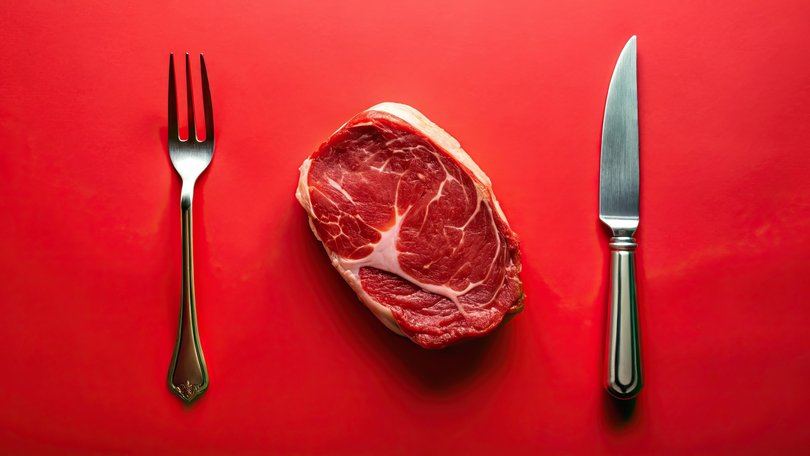SARAH DI LORENZO: What is the carnivore diet and should I be following the growing food trend?
Carnivores, as advocates of the diet are known, have a core belief that we need to live like our ancestors did because we are apex predators. But is it really all its cracked up to be?

Have you noticed the rise of the carnivore diet?
Much of the rise of this diet aligns with our constant craving we have as humans for weight and fat loss rapidly but also interestingly to lower the risk of chronic disease.
It would be fair to say that most of us know that high protein low carb diets support weight loss rapidly, but the carnivore diet takes this to the next level.
Sign up to The Nightly's newsletters.
Get the first look at the digital newspaper, curated daily stories and breaking headlines delivered to your inbox.
By continuing you agree to our Terms and Privacy Policy.So what exactly is the carnivore diet? Well, it is where you literally only eat meat and animal products.
Meat is the centrepiece of all your meals.
The thing about this diet is that not all meats are the same, to do this diet properly you need to avoid all processed meats and animal products and focus on good cuts of meat from animals that are pasture raised, and your food choices should be linked to sustainable practices.
Good quality meats have higher omega 3 fatty acids, vitamin B12 and zinc, plus a better taste which is really important given that you are only eating meat all the time.

When you choose meat that is pasture raised you consume more omega 3 (which lowers inflammation) and vitamins A, E, D, K2, while supporting sustainable farming.
The thing about carnivores (as the diet’s advocates are called) is they have a core belief that we need to live like our ancestors did and that we are apex predators.
The carnivore diet, when done right, claims to improve mental clarity, reduce inflammation, lower blood sugar, satiate the appetite and — the holy grail — lead to weight and fat loss.
These claims would be true as eating only meat lowers blood glucose and glycogen and will put the body into ketosis.
Ketosis is where the body is burning stored fat for fuel so you are losing weight and specifically fat not muscle.
When in ketosis we have better mental clarity and ketosis can reduce oxidative stress in the brain giving neurons more energy and boosting neurotransmitters that benefit our mental health.
Carnivores eat organ meats, low lactose dairy like cheese and butter, seafood, chicken duck, organ meats and red meat.
Duck fat and tallow are used for cooking and the bone marrow is consumed for the good fats and collagen.

A day on a plate on the carnivore diet would be something like eggs for breakfast, beef liver cooked in butter for lunch and dinner would be lamb chops.
Snacks could be hard boiled eggs, beef jerky or pork rinds.
Beverages would be mainly water, no alcohol and many avoid coffee and tea.
The short term success of the carnivore diet makes it very appealing to many and you will find that carnivores are as extremely passionate about the diet as those who are plant based — the passion and dedication is very real.
But these are both complete extremes.
When doing a deeper dive into the carnivore diet there is no real long-term research — in fact, it seems to be completely absent.
So we don’t know what the long-term consequences are.
One thing I can point out is that our ancestors didn’t have a long life expectancy, in fact it was around the age of 30, this is just an observation.
There is research showing those on the carnivore diet can experience chronic constipation, dehydration, disruptions in the gut microbiome, elevated cholesterol and nutritional deficiencies.
There is no fibre in the carnivore diet.
Looking at some case studies you will find that long term carnivores often take statins to manage the cholesterol and a multivitamin although many carnivores see the elevated LDL cholesterol as unimportant as well.

Logically any diet that requires mediations usually means it is creating disease in my opinion.
There is a mountain of evidence that a healthy balanced diet is essential for long term health and wellness.
There are countless large scale observational studies that consistently demonstrate that plant predominant diets are associated with lower incidence of chronic disease, you just need to look at the Mediterranean diet.
We all have different health goals, some are to lose weight, some for longevity, some for a healthy gut or others to lower our risk of disease.
We are all individuals and have the right to choose what to feed ourselves but do your research first, make sure you are looking at the dietary guidelines from all angles and only reputable research to make your decision.
In my opinion the best diet is balanced and includes wholefoods from all food groups.
Education is key.
